 Science
in Christian Perspective
Science
in Christian Perspective Science
in Christian Perspective
Science
in Christian Perspective
Creation Science and Caring for the Creation in Koreaá
Paul Seung-Hun Yang*
Department of Physics Education
Kyungpook National University
Taegu 702-201, Korea1
From: Perspectives on Science and Christian Faith 50 (December 1998): 279-283.
Since the early 1970s, when rapid industrialization accelerated the deterioration of the environment in Korea, some Korean Christians have become concerned about caring for the creation. As a result, several Christian organizations, such as "Korea Christian Ethics Movement," "Citizens Council of Economic Justice," "Ecclesiastical Institute for Environmental Studies" and YMCA, have started to lead environmental movements by setting up environmental divisions in their organizations.
In this paper, I will analyze the attitude of Korean creation scientists toward environmental issues.2 By surveying their theological positions, I attempt to trace the origin of their attitude toward environmental issues.
For this study, I selected members of the Korean Association for Creation Research (KACR), an association of creation scientists with about two thousand members (about two hundred with doctorates). I made a questionnaire that consisted of seven questions about their activities in creation science, their theological positions, and their environmental concerns. The questionnaire was sent to 67 members who are actively propagandizing creation science, by public lectures and writing. Forty-five responded.
Background of Creation Scientists in Korea
Figure 1 shows that the denominational distribution of the
creation scientists who responded is roughly proportional to the relative size
of the denomination. It means that creation science was accepted without any
denominational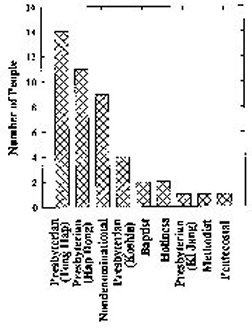 preference, at least in Korea. Regardless of the theological
doctrines of their denominations, most lay Christians in the Korean church are
quite conservative. This is in contrast to the United States where many leading
creation scientists come from the Southern Baptist, the Seventh-Day Adventist,
and other conservative denominations.
preference, at least in Korea. Regardless of the theological
doctrines of their denominations, most lay Christians in the Korean church are
quite conservative. This is in contrast to the United States where many leading
creation scientists come from the Southern Baptist, the Seventh-Day Adventist,
and other conservative denominations.
The distribution of Korean creation scientists by discipline
is somewhat similar to the American creation scientists. As shown in Figure 2,
there 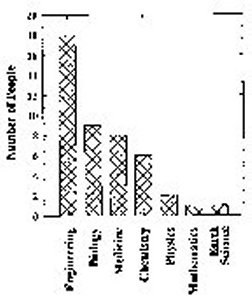 are eighteen engineers, nine biologists, eight medical doctors, six
chemists, two physicists, one mathematician and one earth scientist. It is quite
interesting that scientists from applied science or engineering are dominant.
Even people in biology, who work in fields like genetic engineering,
biochemistry, and so forth, are represented. Dr. Kim Young-Gil, President of the
KACR, is a famous metallurgist.3
are eighteen engineers, nine biologists, eight medical doctors, six
chemists, two physicists, one mathematician and one earth scientist. It is quite
interesting that scientists from applied science or engineering are dominant.
Even people in biology, who work in fields like genetic engineering,
biochemistry, and so forth, are represented. Dr. Kim Young-Gil, President of the
KACR, is a famous metallurgist.3
The academic background of creation scientists in applied
science is reflected in their understanding of the primary importance of
creation science. As indicated in Figure 3, only four selected "More
Scientific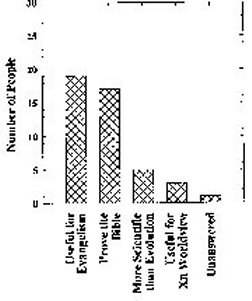 than Evolution" in the question asking about the primary
importance of creation science. Nineteen selected "Useful for
Evangelism" and seventeen, "Prove the Bible."
than Evolution" in the question asking about the primary
importance of creation science. Nineteen selected "Useful for
Evangelism" and seventeen, "Prove the Bible."
Attitude of the KACR Toward Environmental Concerns
Then what is the attitude of the KACR toward environmental
concerns? 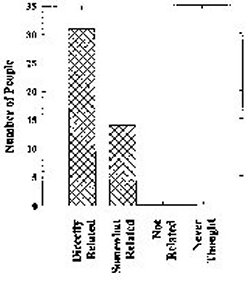 As shown in Figure 4, twenty-nine creation scientists answered that
creation science "Directly Related" to environmental issues and
fourteen responded "Somewhat Related." None said "not
Related" or "Never Thought about It." Despite individual concern,
however, the KACR seems to be consistently indifferent to environmental issues
in terms of its activities.
As shown in Figure 4, twenty-nine creation scientists answered that
creation science "Directly Related" to environmental issues and
fourteen responded "Somewhat Related." None said "not
Related" or "Never Thought about It." Despite individual concern,
however, the KACR seems to be consistently indifferent to environmental issues
in terms of its activities.
Since its inception in 1981, the KACR's primary focus has been in the following activities: giving public lectures, revising high school science textbooks, raising money for a creation science exhibition center, running a publishing company, funding several projects to prove the scientific validity of biblical descriptions, and even hosting two international conferences. But strangely enough, the KACR has been quite indifferent to environmental issues which are related to God's creation. Then the question arises about why this is the case.
(1) Premillennial Atmosphere: Above all, creation science in Korea has been supported by some "otherworldly theologies" in eschatology, God's revelation, and biblical hermeneutics. In particular, eschatology is important to characterize the Korean creation scientist's attitude toward environmental concerns.
For a question about millennialism, Figure 5
shows that eleven Korean creation scientists support premillennialism, two
postmillennialism, three amillennialism, and twenty-nine do not have any
specific view or "Never Heard or Never Thought about It." But it seems
to me that the KACR implicitly follows the premillennial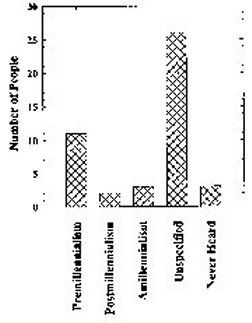 orientation of the
Institute for Creation Research (ICR) in Santee,
CA.4 For example, Dr. Kim Young-Gil was influenced
in becoming a Christian by Hal Lindsay's best-selling premillennial book, The
Late Great Planet Earth.5
orientation of the
Institute for Creation Research (ICR) in Santee,
CA.4 For example, Dr. Kim Young-Gil was influenced
in becoming a Christian by Hal Lindsay's best-selling premillennial book, The
Late Great Planet Earth.5
According to the premillennialist, "the kingdom of Christ will be inaugurated in a cataclysmic way" and "divine control will be exercised in a more supernatural manner than does the postmillennialist." The divine control is "established suddenly through supernatural methods rather than gradually over a period of time by means of the conversion of individuals." "Christ will restrain evil during the age by the use of authoritarian power."6 The premillennialists, whose major concern is the millennium in heaven, are not concerned much with activities which would improve the world, such as social and economic justice and environmental concerns.
Such characteristics of premillennialism are quite similar to those of creation science, which claim the supernatural fiat and a sudden creation of the universe rather than a gradual development over a vast period of time. Although most Korean creation scientists who responded do not know the specific theological arguments of each millennialism, their view of this world is quite premillennial.7
It is very interesting that some minor denominations, which are usually charged as heresies by orthodox churches, are premillennial and support creation science. For example, the Seventh-Day Adventist, the Jehovah's Witnesses, and the Mormons usually equate their activities with the coming of the millennium.8 In particular, the Seventh-Day Adventists, the originators of creation science, believe "the millennium is the thousand-year reign of Christ with his saints in heaven between the first and second resurrections."9
(2) Dispensationalism:
Many American leaders of creation science come from a dispensationalist
background.10 The beginning of the KACR was much
influenced by the ICR, which supports dispensationalism. As shown in Figure 6,
however, most Korean creationists do not support or are not concerned about it,
except 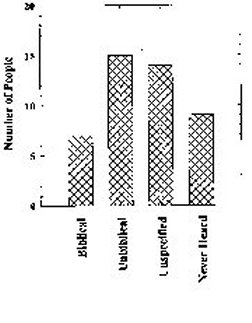 for its hermeneutical principle. One essential characteristic of a
dispensational theology is "a consistent use of the hermeneutical principle
of normal, plain, or literal
interpretation."11
for its hermeneutical principle. One essential characteristic of a
dispensational theology is "a consistent use of the hermeneutical principle
of normal, plain, or literal
interpretation."11
(3) Literal Inspiration of the
Bible: As shown in Figure 7, "literal inspiration" is the
most popular view on the Bible. Many Korean creation scientists did not follow
their denomination's official position about the inspiration of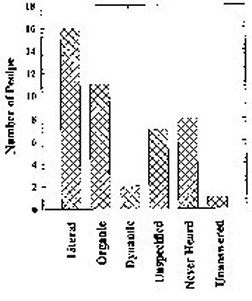 the Bible.
Although most Presbyterian and Methodist churches support a "dynamic
inspiration" of the Bible, thirteen from those denominations support a
"literal inspiration."
the Bible.
Although most Presbyterian and Methodist churches support a "dynamic
inspiration" of the Bible, thirteen from those denominations support a
"literal inspiration."
Those who believe that the Bible was literally inspired do not accept that the Bible directly and explicitly indicates the importance of environmental concerns. They understand that if there is no explicit reference to caring for the creation, they are not responsible for it.
As mentioned above, most Korean creation scientists come from conservative denominations that, although gradually changing their attitudes toward environmental issues, discourage the discussion of Christian stewardship for the environment in creationism forums. The only exception is Dr. Kim Jung Wook, professor of environmental science in Graduate School of Environment, Seoul National University. But it seems that his active concern does not come from his creation science belief, but from his profession.
As shown in Figure 1, twenty-seven of the forty-five leading Korean creation scientists come from quite conservative Presbyterian churches. Conservative denominations include some Presbyterian (Tonghap, Hapdong, Koshin, etc.) churches, the Holiness churches, Baptist churches (including Southern and Bible Baptist), the Full Gospel churches, and even Seventh-Day Adventist churches.
So far, the Christian implications of environmental concerns have been actively discussed within a few "moderate" denominations, such as the Methodist, part of the Presbyterian (Ki Jang), the Anglican, and the Catholic churches. As shown in Figure 1, however, only two of the creation scientists who responded belong to these denominations.
(4) Poor
Communication: In addition to the conservativeness and
otherworldliness of the Korean church and its theology, the Korean creation
scientists have poor communication with theologians and Christian academics, who
could provide various environmental implications of creationism. They have been
excluded from the creationism forum, because, from the beginning, the KACR has
limited its membership to Christians with masters or doctoral degrees in science
and engineering. Poor communication is shown in the question asking about the
influence of the theological position of creationism. As shown in Figure 8, only
five answered "Deep Influence." It is contrasted with 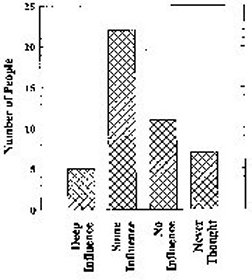 the American
creation scientists' camp in which creation scientists actively interact with
the theological community.
the American
creation scientists' camp in which creation scientists actively interact with
the theological community.
In summary, although individual creation scientists have deep concerns about caring for the creation, the KACR is not actively concerned about it. From the responses to the question about the influence of their theological position on creationism, it seems that their individual concern toward environmental issues does not come from their creation science belief but from other sources. Indifference toward caring for the creation seems to result from the conservativeness of Korean churches and from the poor communication of the Korean creation scientists with other disciplines.
©1998
Notes
1Paul Seung-Hun Yang resigned from his professorship at Kyungpook National University and moved to Vancouver, BC to start the Vancouver Institute for Evangelical Worldview, a branch ministry of Disciples with Evangelical Worldviews, an organization of evangelical Christian scholars.
2By creation scientist, I mean someone who would generally hold the view of the Institute for Creation Research in the United States.
3On February 22, 1997, Kim Young-Gil retired and Song Man Seok, professor of computer science at Yonsei University, was elected as the new president.
4For millennialism, see R. G. Clouse, "Dispensation, Dispensationalism," Evangelical Dictionary of Theology, Walter A. Elwell, ed. (Grand Rapids, MI: Baker, 1984), 715.
5Hal Lindsay, The Late Great Planet Earth (Grand Rapids, MI: Zondervan, 1970).
6Clouse, Evangelical Dictionary of Theology, 715.
7According to Han Jung Gun, Presbyterians, occupying more than 80% of Korean Christians, did not choose a specific position about the millennium and their position varies from person to person. Cf. Han Jung Gun, Biblical Perspectives on the Modern Eschatology (CLC, Seoul) and An Introduction to the Eschatology (CLC, Seoul).
8Clouse, Evangelical Dictionary of Theology, 715.
9Seventh-Day Adventists Believe: A Biblical Exposition of 27 Fundamental Doctrines (Washington, DC: General Conference of Seventh-Day Adventists, 1988), chap. 26.
10For example, the ICR, Grace Theological Seminary, and the Seventh-Day Adventists (major originators of creation science) support dispensationalism.
11C. C. Ryrie, "Dispensation, Dispensationalism," Evangelical Dictionary of Theology, 322.